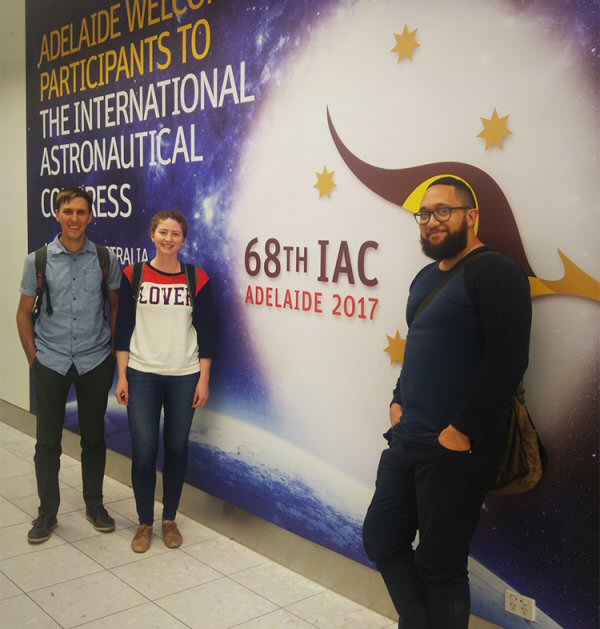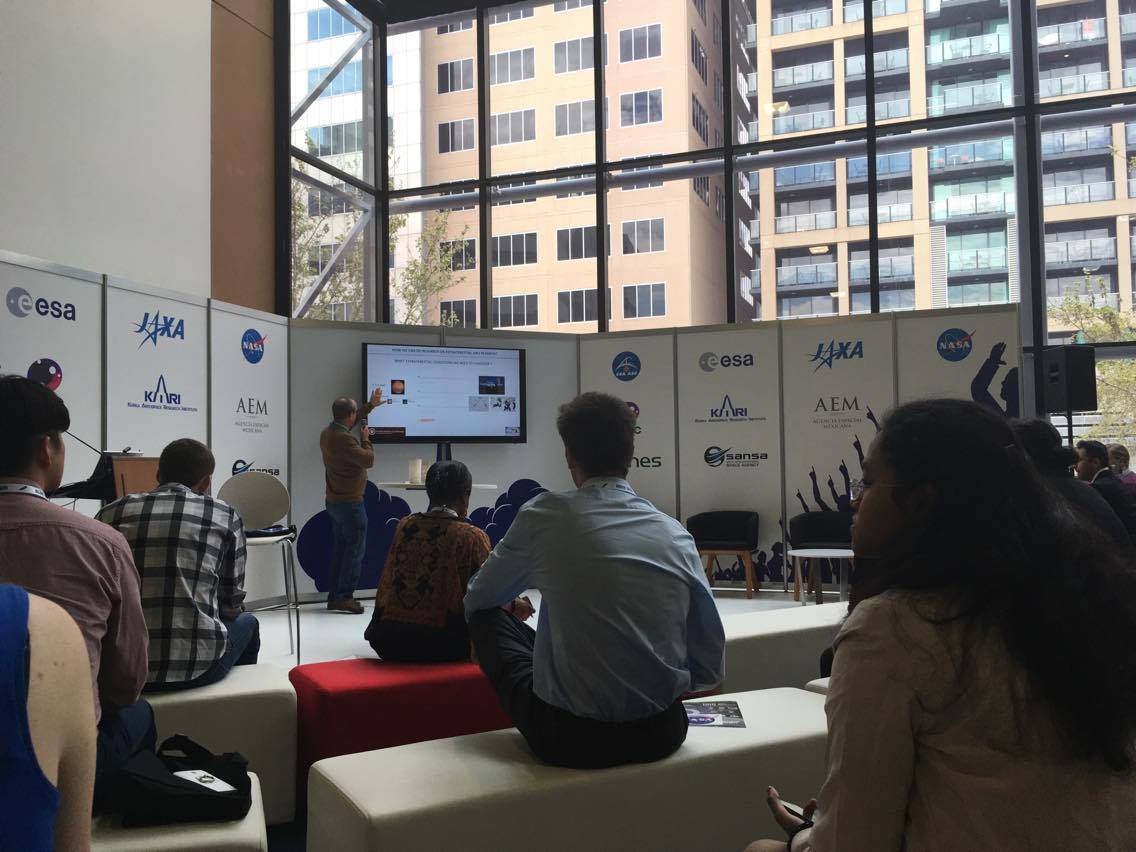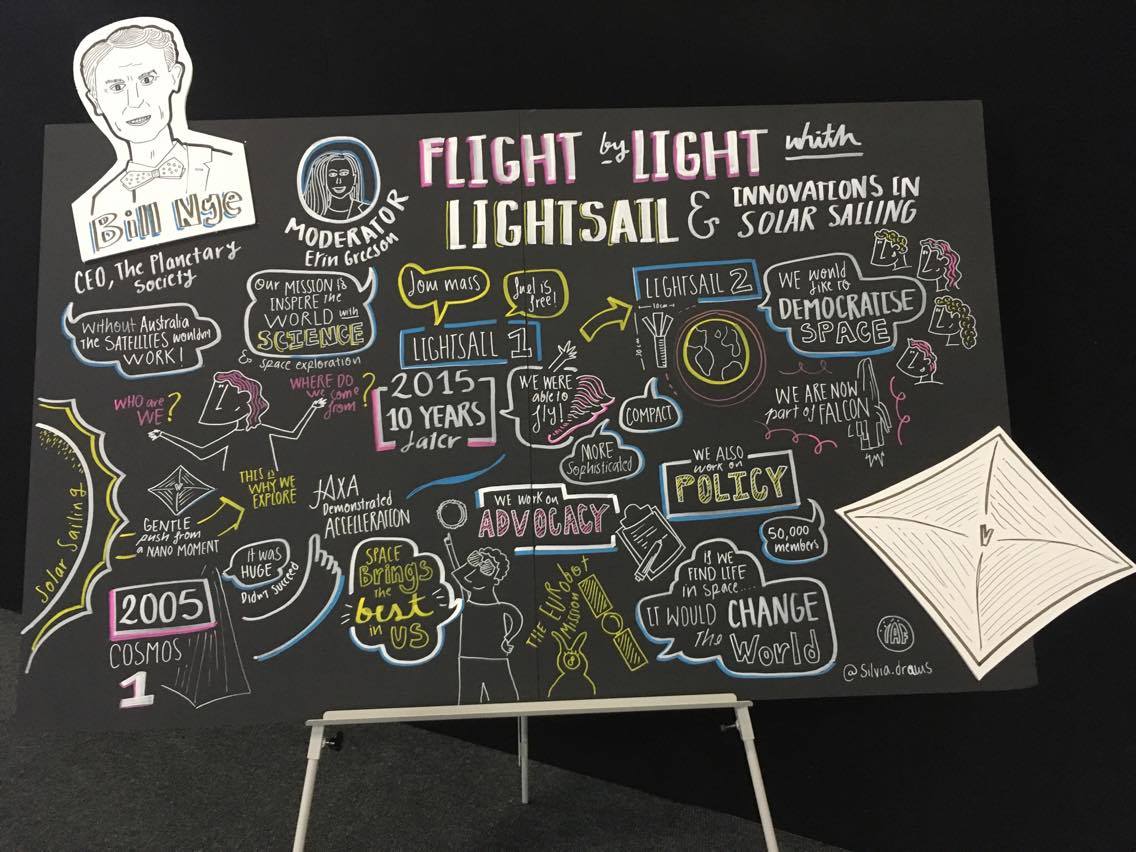Mechanical and aerospace students, Steven Apirana, Brittany Chambers and Oliver Paxton attended the Space Generation Congress (SGC) and International Astronautical Congress (IAC) in Adelaide this year.
The SGC invites top university students and young professionals with a passion for space to meet in conjunction with the IAC, the world’s largest annual gathering of space professionals.
In 2017, the IAC was held in Adelaide - only the second time ever it has been hosted in Australia in its 50-year history.
Steven, Brittany and Oliver received scholarships from the Australian Youth Aerospace Association (AYAA) and the Victorian Space Science Education Centre (VSSEC) to attend the events, and they told us about their inspirational experiences when they returned.
What was it like attending the Space Generation Congress (SGC) and International Astronautical Congress (IAC)?
Steven: Both the SGC and IAC were amazing to attend. Australia’s involvement in space is typically underplayed, but with the announcement of the establishment of an Australian space agency on the first day of IAC, there was an atmosphere of hope and drive throughout the delegates. To be surrounded by likeminded, hopeful space enthusiasts for that announcement is an experience I won’t forget.
Brittany: It was a massive learning experience. Not just in terms of technical content and advancements, but also as an overall view of the industry, how international collaboration is going to be the most important factor moving forward, and learning to work in teams of mixed discipline, experience and culture. SGC was very interesting. Even though I am a part of a mixed engineering discipline team at work, I have never had the opportunity to work in a team where the areas of expertise ranged from engineering to business, to law, policy and marketing. I was in the Space Transportation Working Group where we were required to come up with recommendations on how to develop a sustainable global industry for the future. This was a topic that required technical knowledge, but not necessarily a technical solution - from an engineering point of view. I most enjoyed the experience of working with other students and young professionals from different cultural backgrounds. I had not considered the influence of culture on decision making and policy before. It was eye-opening and a very important lesson.
I found IAC to be quite overwhelming; there was a lot to see, do and learn. As I was on a scholarship supported by the AYAA and VSSEC I spent some of the conference in the International Student Zone. In this area sponsored students from JAXA, NASA, CSA, KARI, ESA and Australia worked together to run robotics workshops for Australian school students. This is part of the International Space Education Board program. It was a great opportunity to demonstrate some of the cool applications of STEM to students. Each of the agencies gave presentations during the week. Most of the other sponsored students were PhD candidates or Masters students, so they presented on their research. Oliver Paxton and I presented a talk on our work through the AYAA. I talked to many interesting and passionate people.
Oliver: It was a fantastic experience to hear from subject matter experts in a wide range of fields within the aerospace industry. It was amazing to be at a conference and have the opportunity to network with so many other students and industry professionals as passionate about aerospace as I am.

What were you most excited about doing or seeing at the event?
Steven: Elon Musk’s presentation on ‘becoming a Multi-planet Species’ was the highlight of the conference for me. Continuing in the vein of ‘hopefulness,’ I believe Musk is in the ‘inspiration game'. His ambitious targets include sending missions to Mars by 2022, establishing a Moon base, and revolutionising international travel times. Rather than meeting scepticism and doubt, the atmosphere was one of excitement and enthusiasm.
Brittany: I was most excited about the opportunity to talk to and work with people from different backgrounds. I think that international teams are going to be the norm in future workplace, so it's important to get used to being considerate of other people’s cultures.
Oliver: Attending a range of plenary sessions and networking with international partners which gave me the opportunity to gain a further understanding in my areas of passion within the aerospace industry.

What particular session was the most interesting and why?
Steven: The Innovation and Entrepreneurship sessions were most interesting to me. One of the panels consisted of CEO’s from four successful start-ups, Rocket Lab, QxBranch, Fleet, and DeltaV, who gave their insights into what it takes to start your own company/organisation. Other sessions that day included a panel with executives from Virgin Galactic, Boeing, and Blue Origin, discussing ‘50 ways to Leave your Earth’. My intention heading to both conferences was to get a better perspective on what is happening in the industry and possibly identify some knowledge gaps which could be exploited. These sessions, in conjunction with the ‘Space Agency’ announcement, left me with a great deal of optimism for the future of Australia’s – and my – involvement in space.
Brittany: I thoroughly enjoyed Bill Nye's Flight by Light presentation, and Charlie Bolden's talk. My favourite technical talk was on Astrobiology and the ethics of forward contamination of ocean worlds.
Oliver: Bill Nye’s presentation on the benefits of the Solar Sail was fascinating, as it’s a new and potentially revolutionary deep space propulsion type. Charles Bolden Jr., the ex-Administrator of NASA gave an inspirational presentation on the past and possible future of the global aerospace industry.

What did the Scholarship application process entail?
Brittany: The scholarship process involved submitting a video answering the question "Why, in 2017, is it important that Australia is hosting the International Astronautical Congress?" in 90 seconds. The challenge of this was to find the most pressing reason to talk about, as there are numerous benefits to hosting the IAC. This scholarship opportunity was unveiled at the 2017 Aerospace Futures conference, run by the AYAA, in Adelaide.
Why is it important to attend conferences like these?
Steven: For me, the benefit is learning about the industry. There are clearly many networking opportunities, but I am still not convinced of the benefit of networking in that way. The SGC gave me the chance to work with a group of students (undergraduate and post-graduate), on a space related issue, to think about the future of space and what that might mean for international diplomacy, and to work collaboratively towards solutions to complex problems. I think it is, and always will be, important to attend conferences, to meet new people, and to continually strive to observe the world from new perspectives.
Brittany: Attending SGC and IAC or similar conferences is very important for professional and personal development. You simply do not get exposure to the industry within university studies. To be successful in your career or even breaking into the industry, you need to understand it. Conferences allow you to develop your understand and start to make the professional connections that will help you to succeed in the future.
Oliver: Attending conferences like these give students a broad view of what is possible to achieve and work in within the aerospace industry. University does a fantastic job to introduce students to the aerospace field as a whole through a wide range of subjects, however it is at conferences like these that we can gain in-depth and specific knowledge of the potential jobs and fields in which we can either work or further study.
For more information about studying a Bachelor of Engineering (Honours), specialising in mechanical and aerospace engineering, or a Master of Engineering, visit UQ's Future Students website.
To learn more about UQ's School of Mechanical and Mining Engineering, visit the School's website: www.mechmining.uq.edu.au
Learn about scholarships at UQ.



